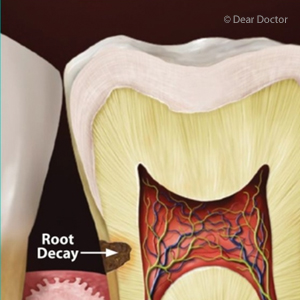Finding out you have a cavity isn’t the best of news. But finding out it’s a root cavity is even worse: if not treated, the decay can spread more rapidly than a cavity occurring in the tooth’s crown surfaces.
Our teeth are basically composed of two parts: the crown, the visible tooth above the gum line, and the roots, the hidden portion beneath the gums. The root in turn fits into a bony socket within the jaw to help hold the tooth in place (along with attached gum ligaments).
A tooth crown is covered by an ultra-hard layer of enamel, which ordinarily protects it from harmful bacteria. But when acid produced by bacteria comes into prolonged contact with enamel, it can soften and erode its mineral content and lead to a cavity.
In contrast to enamel, the roots have a thin layer of material called cementum. Although it offers some protection, it’s not at the same performance level as enamel. But roots are also normally covered by the gums, which rounds out their protection.
But what happens when the gums shrink back or recede? This often occurs with gum disease and is more prevalent in older people (and why root cavities are also more common among seniors). The exposed area of the roots with only cementum standing in the way of bacteria and acid becomes more susceptible to cavity formation.
Root cavities can be treated in much the same way as those that occur in the crown. We first remove any decayed tooth structure with a drill and then place a filling. But there’s also a scenario in which the cavity is below the gum line: In that case, we may need to gain access to the cavity surgically through the gums.
If you have exposed root areas, we can also treat these with fluoride to strengthen the area against cavity formation. And, as always, prevention is the best treatment: maintain a daily schedule of brushing and flossing and regular dental cleanings to remove bacterial plaque.
Because decay can spread within a tooth, dealing with a root cavity should be done as promptly as possible. But if we diagnose and initiate treatment early, your chances of a good outcome are high.
If you would like more information on treating root cavities and other forms of tooth decay, please contact us at (860) 889-6445.

